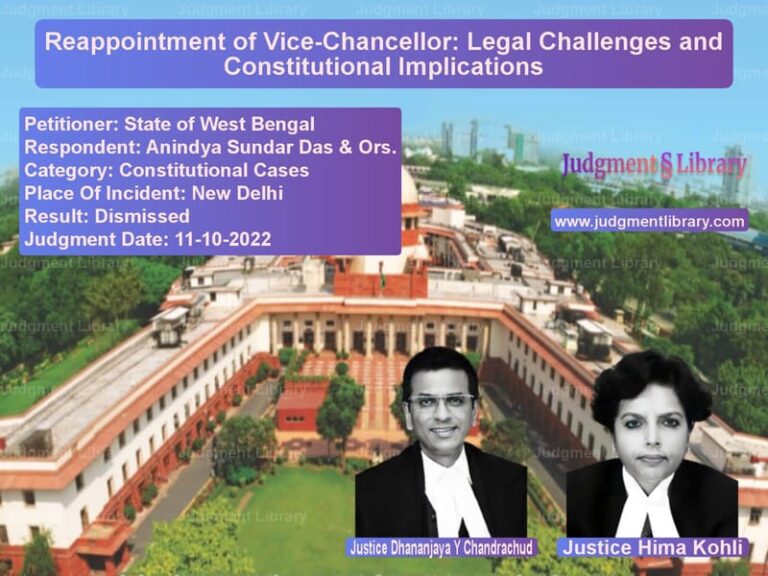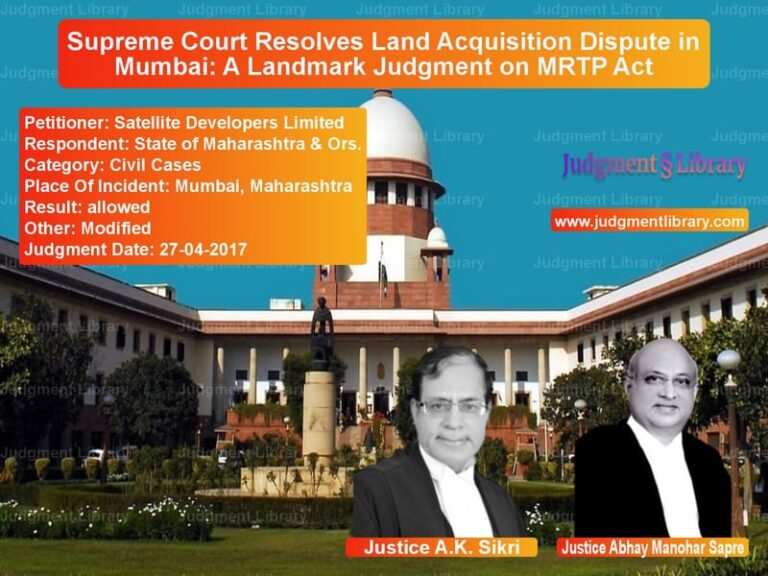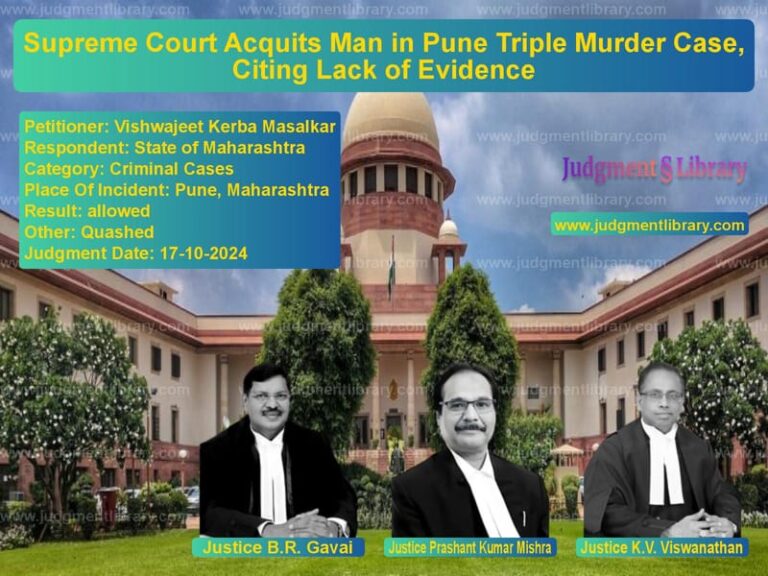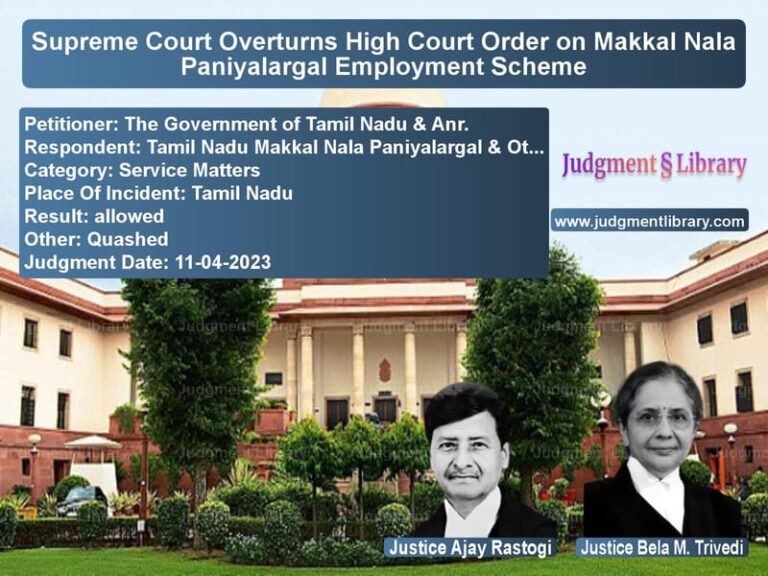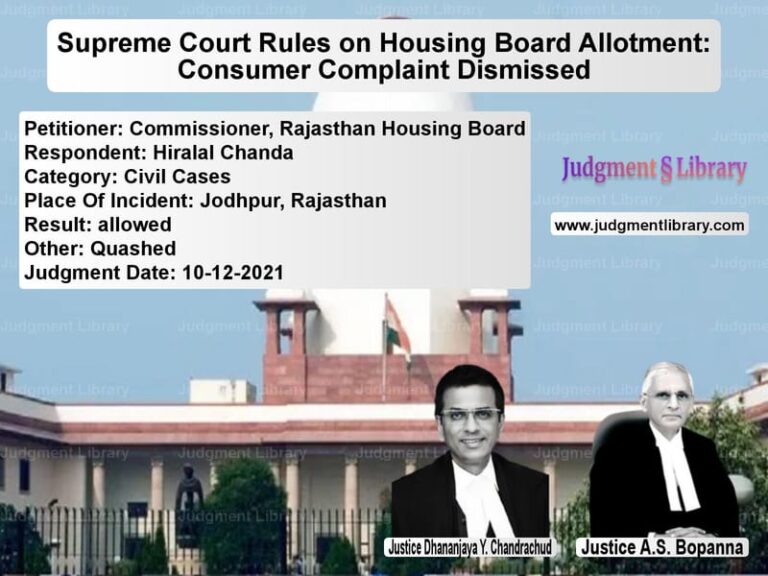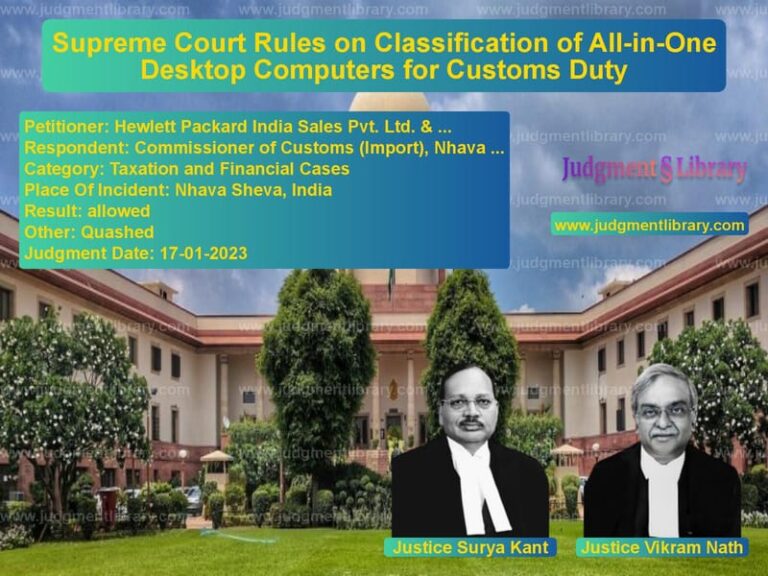Juvenility Claim in Murder Conviction: Supreme Court Orders Release After 17 Years
The case of Sanjay Patel vs. The State of Uttar Pradesh is a significant ruling on the issue of juvenility in criminal cases. The Supreme Court addressed whether the petitioner, convicted of murder under Section 302 of the Indian Penal Code, was entitled to be treated as a juvenile under the Juvenile Justice (Care and Protection) Act, 2000. The Court ultimately ruled in favor of the petitioner, directing his immediate release after he had already served more than 17 years in prison.
Background of the Case
The petitioner, Sanjay Patel, was convicted for murder by the Sessions Court, Maharajganj, on May 16, 2006. The crime was committed on January 8, 2004. Following his conviction, he was sentenced to life imprisonment. His appeals before the Allahabad High Court were dismissed, leading him to file a Special Leave Petition (SLP) before the Supreme Court in 2009. However, the SLP was dismissed on August 13, 2009.
Years later, the petitioner filed a Miscellaneous Application before the Supreme Court, claiming that he was a juvenile at the time of the offense and thus entitled to special treatment under the Juvenile Justice Act. He submitted evidence, including his high school records, to establish his date of birth as May 16, 1986, which meant he was 17 years, 7 months, and 23 days old when the crime occurred.
Legal Framework for Juvenility
Under the Juvenile Justice (Care and Protection) Act, 2000, an accused who was a juvenile at the time of the offense is entitled to special treatment. Key provisions include:
- Section 7A: Allows an accused to raise a claim of juvenility at any stage, even after the final disposal of the case.
- Section 4: Establishes that only the Juvenile Justice Board has jurisdiction over juveniles.
- Section 15: States that a juvenile can be sentenced to a maximum of three years in a special home.
Arguments of the Petitioner
- He was a juvenile at the time of the offense, as per his birth records.
- He had already served 17 years and 3 days in prison, which exceeded the maximum sentence under the Juvenile Justice Act.
- The finding of the Juvenile Justice Board confirming his birth date had not been challenged by the State.
- Under Section 7A(2), his conviction by the Sessions Court should be deemed invalid.
Arguments of the Respondent (State of Uttar Pradesh)
- The prosecution had convicted him under Section 302 IPC based on strong evidence.
- The claim of juvenility was raised much later, long after the conviction was finalized.
- Even if juvenility was established, it should not automatically result in his release.
Supreme Court’s Ruling
The Supreme Court, comprising Justices A.M. Khanwilkar and Abhay S. Oka, ruled in favor of the petitioner and ordered his immediate release.
1. Juvenility Claim Was Valid
The Court emphasized that under Section 7A, juvenility can be raised at any stage. Since the Juvenile Justice Board had already verified the petitioner’s birth date, his claim was legally sound.
2. Conviction Stands Nullified
Referring to Section 7A(2), the Court ruled that once juvenility is established, the earlier sentence becomes ineffective. The Court noted:
“The sentence passed by the Criminal Court shall be deemed to have no effect in such a case.”
3. Serving 17 Years in Prison Was Unjust
The Court observed that under the Juvenile Justice Act, the maximum sentence for a juvenile is three years in a special home. Since the petitioner had already served more than 17 years, further detention was deemed unfair and unjust.
4. Immediate Release Ordered
The Court directed that Sanjay Patel be released forthwith, provided he was not required in any other case. The ruling stated:
“It will be unjust to send the applicant to the Juvenile Justice Board now. The applicant shall be forthwith set at liberty.”
Impact of the Judgment
This ruling has significant implications:
- Reaffirms that juvenility can be raised at any stage of legal proceedings.
- Ensures that individuals wrongly tried as adults are given relief under the Juvenile Justice Act.
- Prevents juveniles from serving sentences that exceed the maximum prescribed punishment.
- Strengthens the role of the Juvenile Justice Board in verifying age-related claims.
Conclusion
The Supreme Court’s decision in Sanjay Patel vs. The State of Uttar Pradesh reinforces the importance of the Juvenile Justice Act in protecting minors from excessive punishment. The ruling ensures that juveniles are treated fairly under the law and that age-related claims are given due consideration even after conviction.
Petitioner Name: Sanjay Patel.Respondent Name: The State of Uttar Pradesh.Judgment By: Justice A.M. Khanwilkar, Justice Abhay S. Oka.Place Of Incident: Maharajganj, Uttar Pradesh.Judgment Date: 13-04-2022.
Don’t miss out on the full details! Download the complete judgment in PDF format below and gain valuable insights instantly!
Download Judgment: sanjay-patel-vs-the-state-of-uttar-p-supreme-court-of-india-judgment-dated-13-04-2022.pdf
Directly Download Judgment: Directly download this Judgment
See all petitions in Juvenile Justice
See all petitions in Judgment by A M Khanwilkar
See all petitions in Judgment by Abhay S. Oka
See all petitions in allowed
See all petitions in Quashed
See all petitions in supreme court of India judgments April 2022
See all petitions in 2022 judgments
See all posts in Criminal Cases Category
See all allowed petitions in Criminal Cases Category
See all Dismissed petitions in Criminal Cases Category
See all partially allowed petitions in Criminal Cases Category


